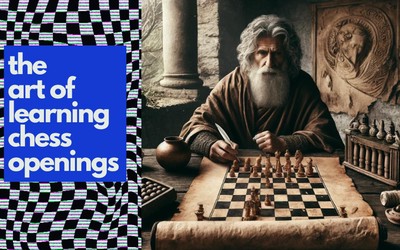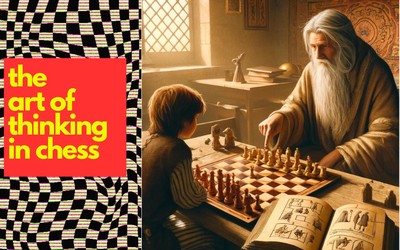
AI Generated Picture
The art of solving puzzles, and calculating: A guide on how to train properly.
Training calculation isn't just about going "takes takes takes takes and then there there there there"Let's be honest.
We all want to improve our chess ratings. I would honestly consider taking a trip to the Himalayas barefoot while I am fasting for months if that would mean I finally achieve the rating goals of mine. However, only if life were that simple!
An extremely important part of improving in the world of 64 squares is to improve your tactical, visualization and calculation skills.
What skills does solving puzzles mostly effect?
- Tactical skills are mostly the ability to recognize that there's a potential tactic in the position. It is essential that if you are unable to spot Forks, Skewers, Discovered Attack, etc, then it not only makes you miss wins but also leads you to blunder.
- Visualization skills are the ability to calculate ahead. In Chess, before you decide to play your move, you need to see how your opponent will react. A good chess player can visualize the forthcoming moves in their head with ease. They are also able to play chess blindfold.
- Calculation skills are quite similar to visualization skills, however, it is mostly about the depth of your thinking. How much are you able to calculate ahead, how many variations, how much depth, and so on?
These are three different skills that I can immediately think of, and the way of improving at them is the same: Solve Puzzles.
However, there's a right way to solve puzzles and a wrong way. It's extremely important that you use proper techniques when solving puzzles to avoid building bad habits and to ensure that the utmost benefits are received as the result of the training.
So, how do I actually solve puzzles?
- Mindset Matters: Don't just solve puzzles for the sake of ratings, or to boast about your tactical ability. Approach them with a genuine desire to learn.
- Avoid Guesswork: It might be tempting and even okay to guess after a few minutes of contemplation, but that shouldn’t be your primary approach. Take time with each puzzle, and understand it before you attempt to solve it.
- Visualization: Calculation is meant to improve your visualization skills. So, visualize! When confronted with a Chess Puzzle, try to calculate your moves, and then how your opponent will react. The more the depth, the better! Try to calculate variations, and lines in depth - All in your head!
- Hold on, my dear instinct!: Do not let your instinct tell you a move instantly when you see a position. This is an extremely difficult rule to follow, but the first thing you should try doing when you see a chess position is to calm down, count the material, understand your opponent's perspective (their threats/ideas, current situation), and then start looking at tactical motifs.
- Environment, matters!: Puzzles are done best when in a concentrated environment. If you're in a rush, or sitting in the middle of a boring office meeting, try solving Puzzle Racer instead. Puzzle Racer is a fun, quick way to train your basic tactical motifs. Every time you do a puzzle racer, try to beat your previous high score!
But.. wait! I know all of this, but I still cannot resist playing the move-out and failing the quiz. Well! Don't worry, you're not the first one! It is hard not to get excited (or in some situations, bored) and play the move-out immediately. However, if this is a regular occurrence, I'd think solving puzzles online is not for you.
The Alternative
For some, online puzzles might not be the best platform. In such cases, consider classic chess tactic books. Take a look at the position given in the book, think for a while, and write down your calculation. I highly recommend writing down the calculation somewhere, as this way, you'll try and list as much as possible, and instinctively calculate more. It is also easier to track where you went wrong this way!
Since the entire process is not easy, and playing a move requires calculation, guess work minimizes, and hard work increases.
There are many good calculation books, such as my personal favorites': Manual of Chess Combinations series, The Woodpecker Method, Encyclopedia of Chess Tactics, Chess Tactics for Champions (for Beginner players)
Goodbye, folks!
About the Author
Adarsh Tripathi - FIDE Master and Chess Coach at Magnus Chess Academy. Author of the Chessable Course, "World Class: Ding Liren". For inquiries [including for coaching], contact: adarsh [at] chesscoaching.org
More blog posts by adarshwick

Openings 101: Breaking down learning openings
Let's tackle one of the most important questions of the universe. How on earth do I learn openings?